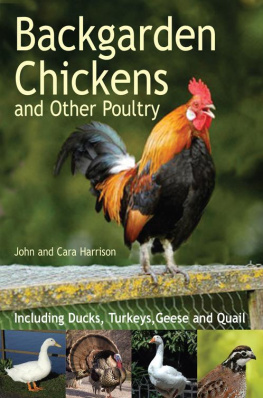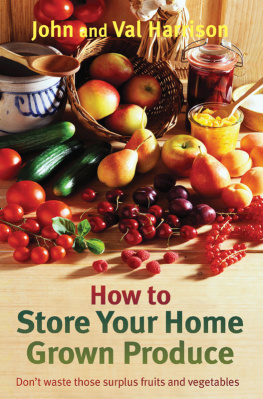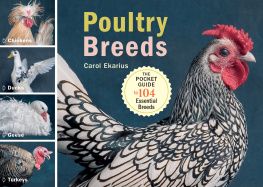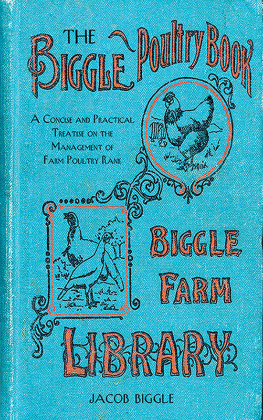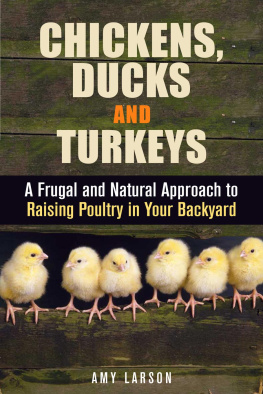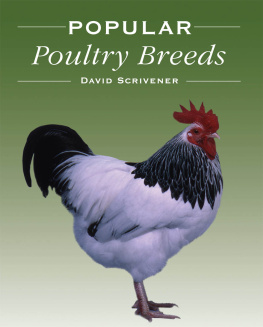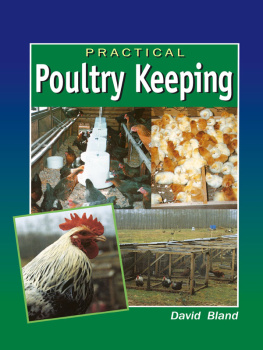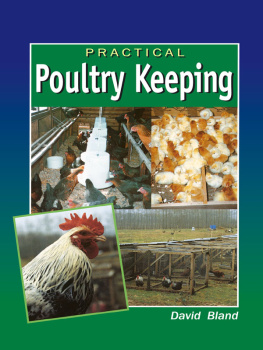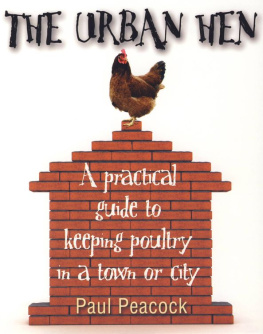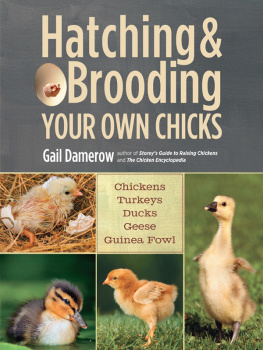To close ones eyes and dream of a home in the country with its lawns, its gardens, its flowers, its songs of birds and drone of bees, proves the sentimental in man, but he is not practical who cannot call into fancys realm the cackle of the hen.
From: Making a Poultry House by M Roberts Conover, 1912
This book is for those considering or already keeping some poultry in their back garden. Although most people start with chickens, weve also touched on the other poultry that you could have: ducks, turkeys, geese and quail.
Ducks, in particular, are enjoying a resurgence as a backgarden bird. Despite what you may think, you dont need a pond and we explain how to keep happy, healthy ducks without one. They mix well with chickens in the same garden so theres no reason not to enjoy both.
A book is in some ways a reflection of its authors and this one is no exception. Cara Harrison keeps her hens, ducks and quail in a small urban back garden while her father, John, has a smallholding in Wales after many years of suburban living and keeping an allotment.
Both of us aim to be as self-sufficient as reasonable in the modern world and our approach reflects that. But that doesnt mean were totally practical, as our collection of retired aged hens and pet ducks who escaped their destiny in the oven will show.
This is not a book for those who want to make a living from their poultry but we show how you can, if not cover, at least make a contribution to the cost of your hobby from selling your eggs.
Many people simply keep their poultry as pets who give them eggs as a bonus, and thats perfectly fine. Its often a surprise to new keepers just how responsive and entertaining chickens and ducks can be. Not to mention how therapeutic it is to discuss your problems with your flock. They might not answer, but theyre great listeners!
On the other side of the coin, more people are now considering raising their own table birds. When you look at the horrific reality of large-scale commercial production of poultry meat, there is a lot to be said for raising your own. Not just on humanitarian grounds either, we explain why poultry meat home-raised on a small scale is actually better for you. Raising table birds isnt for everyone and we explain the pros and cons so you can decide for yourself.
Weve tried to cover everything you might need to know when keeping a small flock at home but also tried to avoid swamping you with too much information. For example, we cover the most popular breeds for those starting out but not every breed. In fact, you could fill an entire book with just the different breeds of chicken you can find. And end up so confused youd never get started!
Wed like to thank Lesley Williams and Ann Clarke for their help and criticism of the first draft of this book. Wed also like to thank the members of our website forum for their help: the beginners who asked the questions we would never have thought of and the experts who share their knowledge so freely.
Before setting out to collect your first birds you should make sure that you have everything ready in advance. Trust us: it will make life easier for everyone if you are well prepared.
One of the first things to do is to find a local vet who is willing and capable of treating poultry. Not all small-animal vets will treat them and some will treat but have not done the relevant courses to know enough about poultry-specific illnesses.
Asking around other poultry keepers or checking online lists of poultry-friendly vets is a good idea before you get your first birds. Although a lot of poultry illnesses can be home-treated, some will likely need veterinary treatment and, if you yourself are unwilling to cull, you will at some point need the vet for that sad final injection.
Chickens, ducks, geese, turkeys and quail may not be family pets for some people but they do still deserve a high level of care and should never be left to suffer. Usually when you need a vet it is an emergency and knowing which vet you can call will be a boon.
Going on a backgarden poultry-keeping course is a good idea for those who have never kept poultry before. We hope this book will give you a good grounding and tell you all you need to know to get started, but no book can compete with actually handling a bird.
In addition, if you intend to breed meat birds it is a good idea to attend a course where safe culling methods are taught. If you wish to treat your own birds and come the final day do the deed yourself instead of using a vet, you should also make sure you know how to humanely cull an injured or sick bird. We would, in fact, recommend that all poultry keepers learn how to humanely cull. We have had occasion to do this late at night and on a weekend when the vets were not open and when leaving the bird to suffer would have been, in our opinion, cruel and inhumane.
Setting aside a poultry store cupboard whether in the house or shed is a good idea. Youll gradually build up a stock of those things you need occasionally and keeping them in one place means youll easily find them.
The checklist below covers what you need to have ready before you bring your birds home or what you are going to need pretty sharpish if youve arrived back home from a show with three hens in the back of the car!
Basic New Poultry Keeper Checklist
Housing Make sure you have a poultry house that is the right size and style for your new birds.
Run If you have a predator problem or wish to restrict the area your new birds are kept in, a run should be in place before they come home to you.
Bedding You need to have decided which bedding and nest box filler you are going to use and have got this prior to collecting the birds.
Feeder and Drinker You need to have both of these ready for your poultry and will have to make sure they are large enough for your new flock. Having a spare feeder and drinker is also a good idea.
Feed Make sure you have the right feed for your new birds. Often the breeders will tell you what they have been feeding the birds on before you collect them.
Disinfectant/Cleaning Equipment You will need to clean the house at least once a week and it is also a good idea to do this before the birds come home with you. Dry disinfectants are better for winter months when wooden poultry houses will take longer to dry out.
Egg Storer You will need somewhere to keep the lovely eggs your new girls are going to give you, so make sure you have somewhere to store them, either a cool, dark place or in the refrigerator. Once you have refrigerated eggs, you will need to keep them in there. This is due to eggs being easily susceptible to temperature changes as well as bacterial development increasing at room temperature thereby reducing egg quality and life span if you swap them back.
In time, new additions will be made to your poultry store cupboard, including items such as wormers, red mite powder, lice treatments, Apple Cider Vinegar, purple antiseptic spray, beak bits, etc. You may wish to get these in advance or wait and get them as your flock needs them.

